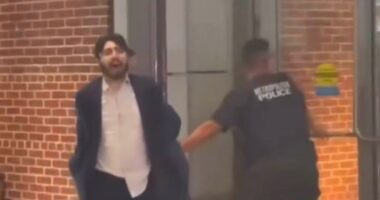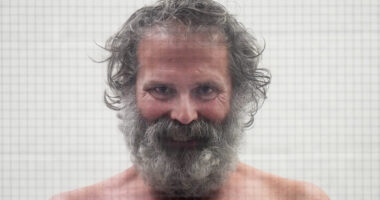AN HOA resident was shocked to learn the neighborhood’s CCTV cameras were used to spy on him at a pool.
His housing association sent him surveillance footage in the creepy incident – which also recorded a private chat with a friend.


He was particularly concerned about the invasion of privacy as it’s home to a lot of military folk.
An anxious individual sought legal guidance from Ryan Poliakoff, a lawyer and writer located in Boca Raton, Palm Beach County, Florida, regarding a troubling situation.
In a Q&A published in the Palm Beach Post, “K.B.” explained that his HOA records both visuals and audio at the clubhouse and pool.
He discovered that a surveillance system was rigorously monitoring residents, including eavesdropping on their conversations, when he was recorded on camera leaping over a pool fence due to a malfunctioning gate.
K.B. later received an HOA video showing him hopping over the barrier to speak with a neighbor. It included audio of their conversation.
He was also told there were two other gates he could have used for access to the pool.
K.B. wrote: “I was shocked. I understand the video, but pool installers told me it is illegal to record audio.”
He confirmed that the HOA has a sign at the pool advising users: “Entering this facility …. You give permission for recordings to include audio.”
The man expressed apprehension about the potential secret recording of discussions, particularly considering the significant number of military personnel residing in the vicinity.
K.B. asked whether the HOA could legally monitor residents in such a way despite “private conversations that ought not to be heard or recorded.”
The name and location of the HOA were not provided.
WARNING SIGNS
Poliakoff replied that his housing association was bound by Florida Statutes which outline rules on communications and surveillance.
The state’s law bans people from recording conversations without consent.
However, he warned K.B. that it appeared he was fighting a losing battle.
He explained that the term “oral communication” – as per Chapter 934 of the statutes – has a specific meaning.
Poliakoff said this phrase is defined as, “a communication ‘uttered by a person exhibiting an expectation that such communication is not subject to interception under circumstances justifying such expectation….'”
K.B. was told that it appeared difficult to justify his expectation of privacy in the circumstances.
That’s because he was “in a semi-public place where signs expressly informed you that audio was being recorded,” the expert added.
Poliakoff also said: “These laws are intended to address wiretapping or placing of clandestine cameras in offices or homes — not public security cameras.”
But he advised that given the large number of military people living in the area, they should take care not to divulge “confidential subjects” unless they are “in a truly private place.”
Poliakoff works as general corporate counsel to condominium associations, homeowners associations, master associations and country clubs.
The U.S. Sun was unable to contact either K.B. or the anonymous housing association for further comment.
What is the meaning of HOA?

An HOA is a homeowner’s association, which is an organization that aims to structure a clean and cohesive place to live for residents.
They are often seen in entire neighborhoods, subdivisions, condominiums, family homes, or townhouses within “a planned development.”
It acts as a governing body for tenants after being used for marketing, managing, and selling homes by real estate developers.
How does an HOA work?
HOAs are run and funded by residents to ensure the community can function together, remain visually appealing, and keep property values high.
They primarily focus on common areas of a neighborhood, such as roads, parks, and pools, and provide locals with an HOA rule book to live by.
Known as covenants, conditions, and restrictions (CC&R), these regulations are enforced by an elected volunteer board of directors.
Restrictions include forbidding people to make physical changes to their homes without permission and strict rules for where you are permitted to park.
Penalties can be issued for breaching the rules – seeing fines being issued and even litigation in some severe cases – as most HOA’s are incorporated and subject to state law.
All members of an HOA must pay a monthly fee and occasionally chip in for larger community expenses, for officials to use the money to pay for maintenance, utilities, and other amenities.
The issue of HOA cameras has also been discussed elsewhere online, including Reddit.
One person wrote three years ago on the popular platform: “We recently had cameras installed in some common areas due to homeless entering the pool area.
“I assumed the security company, patrol company and management company would be the only ones with access to the cameras but that doesn’t seem to be the case.
“I am just curious how that is working in other communities with similar situations.”
CREEPY CCTV
One person responded: “It’d be creepy if volunteers were actively monitoring cameras aimed at swimsuit-clad residents by the pool.”
An HOA resident replied that their neighborhood has cameras on streets and around common areas “for safety and security.”
They added: “Management and the board can access the recordings if needed to respond to an incident. We don’t get live feeds and don’t get to watch just for the heck of it.”
Another person said their HOA had installed cameras around the clubhouse and pool – but the latter CCTV was not pointing at swimmers.
They said: “The camera system is offline and records to a device that we keep locked in a closet in the clubhouse.
“We (the board) created a policy that no one can look at footage alone, there must always be two board members.”
One resident said they had an additional surveillance concern: “My HOA are using automatic license plate readers.
“[These] are tied into a nationwide AI system to automatically track and analyze every movement of every car that passes one of their cameras.
“The folks that run my HOA are somewhat mum on who really has access to this data…”

















